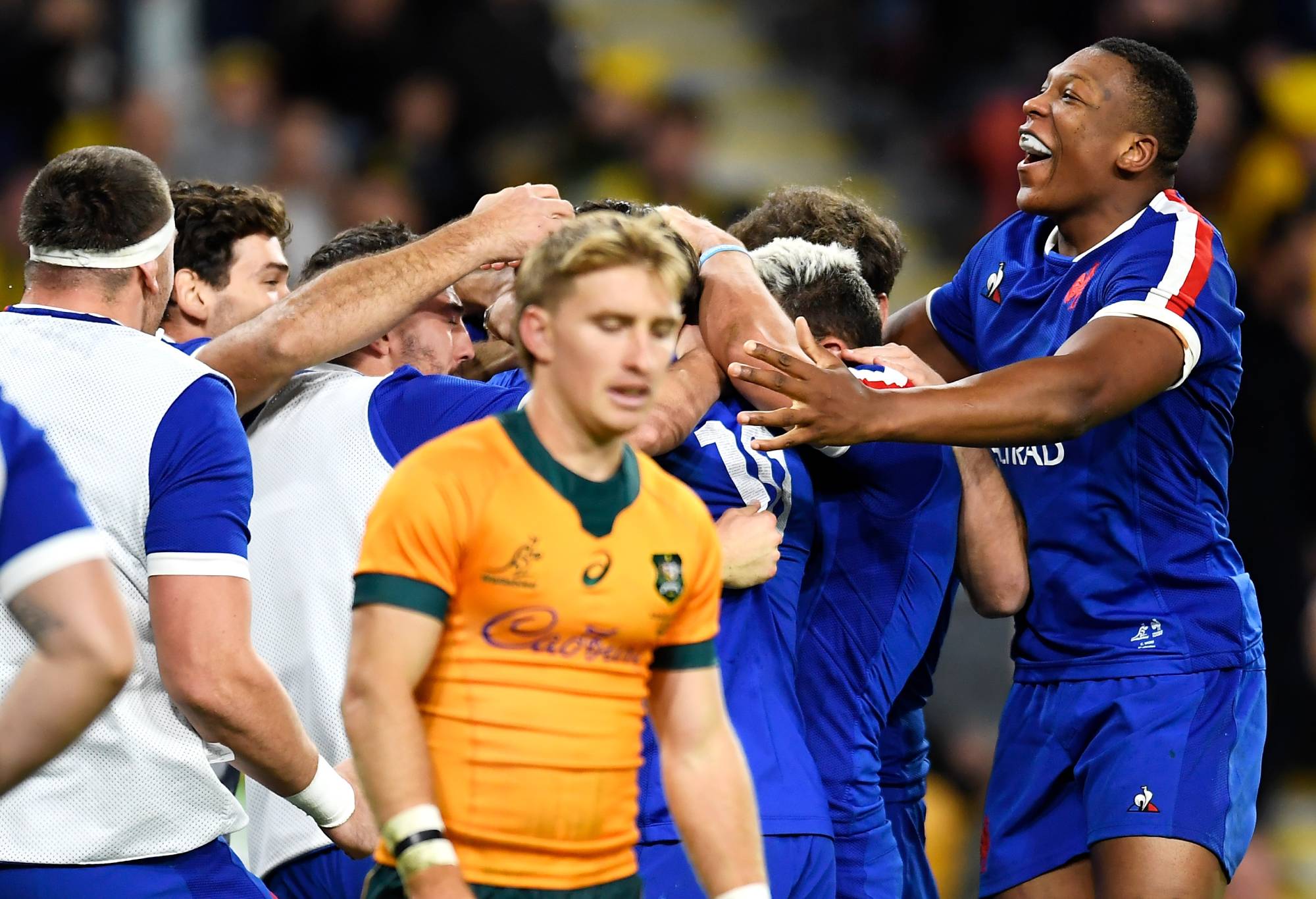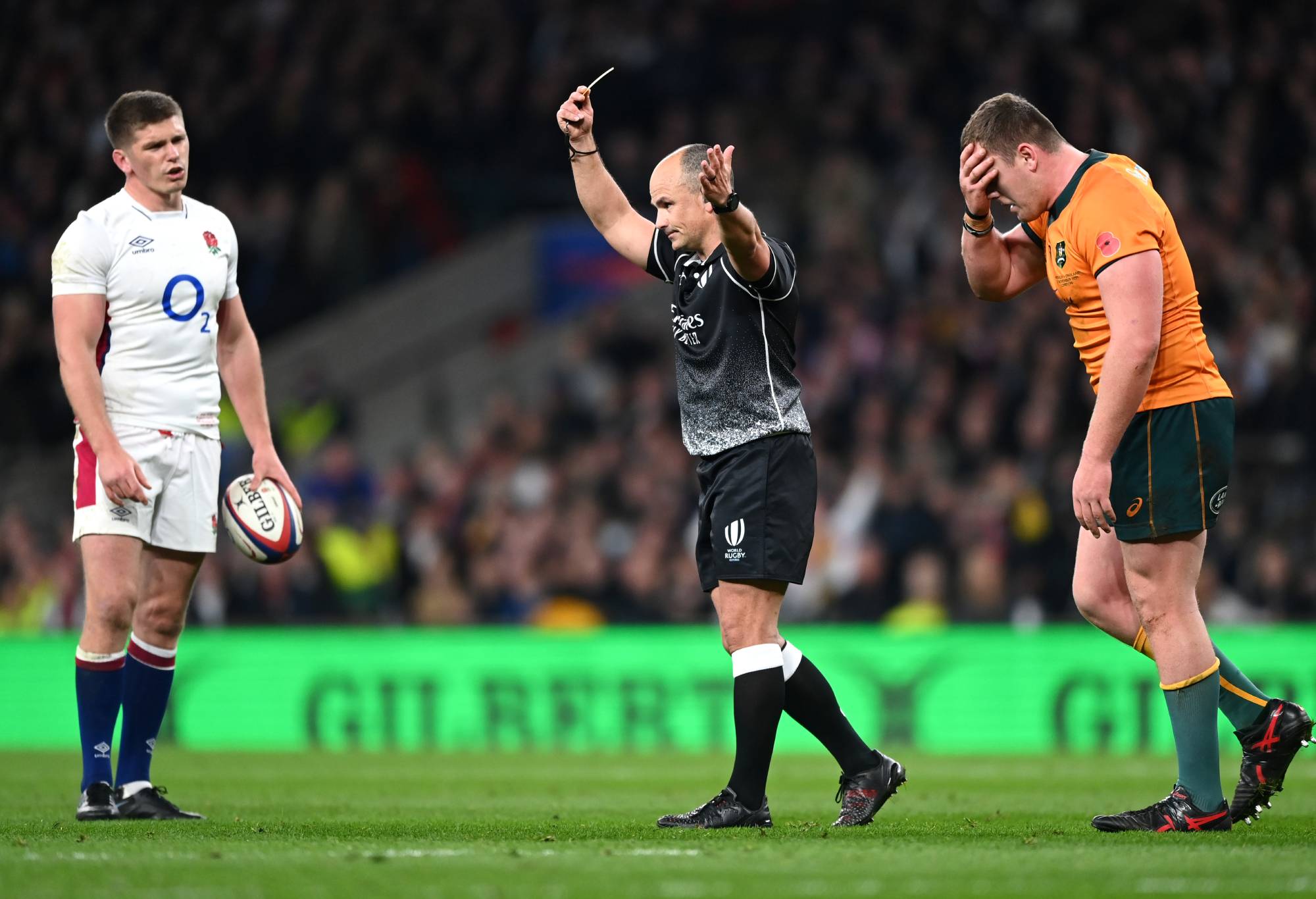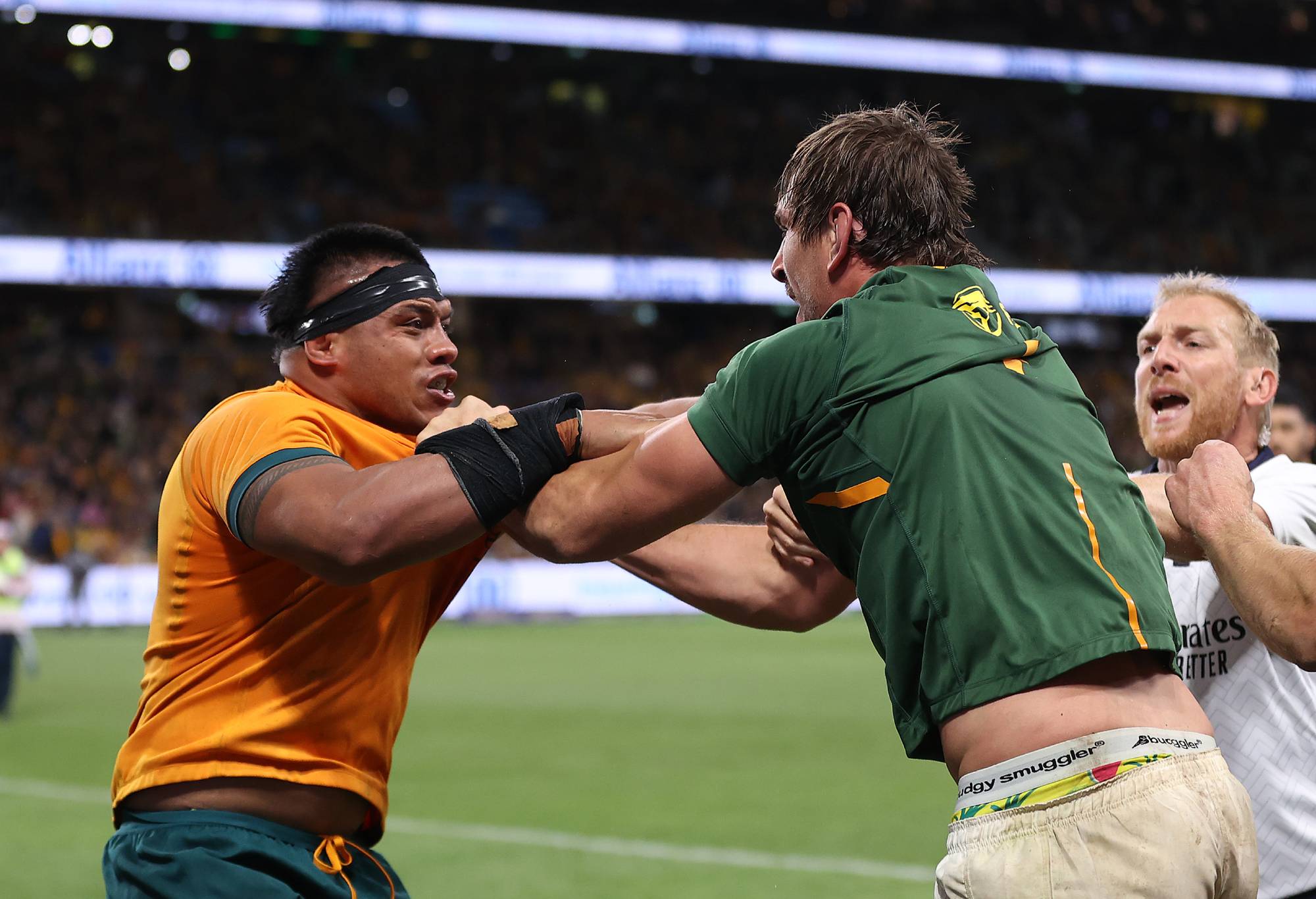The long shadow of the silver gilt Cup hangs over every match, each injury and all the cards.
France has quelled riots in the banlieue, but nobody can tamp down the nation’s certitude they will win the Webb Ellis Cup for the first time. With satyr on one handle and a nymph on the other, this five-kilogram trophy seems like the title of a show at the Lido.
The French are aroused. But are they hard enough?
Their team is training in the extreme hardship of, wait for it, Monte Carlo. Prince Albert II of Monaco is looking on just to make sure all is kosher.
Number eight (or as the French say ‘third-line’) Greg Alldritt has pronounced the training both as ‘merde’ and ‘a little too hot.’
I have been around the French in the heat of a Corsican summer and freezing on the spine of the Vallee Blanche in Chamonix and one constant remains: they are never happy with the temperature or sub-Michelin food. If there is one thing which will rob them of their satyr nymph, it will be fitness; mental toughness.
The cold plunge industry cannot make a go of it in France, unless they offer fur-lined hoodies.
The nation of France is behind their team. Almost too much. As L’Equipe asked on their behalf: “The question precisely was to know why the Tricolor staff decided to schedule physical training at the beginning of the afternoon, when the sun is beating down terribly?”
The goal ‘is to trigger an inflammatory reaction and then the body regains its balance naturally,’ explained Bruno Boussagol, the ‘health manager’ of the French team. Monsieur Boussagol added the squad are not permitted to recover with cold baths or in the pool and during rest days, ‘they are forbidden to bathe! This is not a joke.’ Boussagol again: ‘Contrasting baths are prohibited. It is necessary to pass a course on their capacity of explosiveness.’

(Photo by Albert Perez/Getty Images)
Jason ‘Bourne’ Ryan is probably not having to explain why he is torturing his pack.
The Welsh under master fitness czar Warren Gatland, who never seems to join in any sort of gym himself, have adopted a diametrically approach in Switzerland, with ripped and shredded players constantly in cold water, freezing and shivering, and the oldest having retired, primarily to skip the training.
France has already declared the Irish and South African challenges laughable, but they have deemed the All Blacks a serious threat.
The editorial view by L’Equipe of the Auckland beating was: “a real fireworks display; spectacular and instructive.”
They expounded: “From the outset, Sam Cane and his teammates multiplied the challenges in tight spaces, tried to infiltrate the slightest interval and added up the playing times. The versatility of the front five, the adaptation of all to the positions of the South African defense and the sequence of passes propelled the athletic Shannon Frizell into the opposing in-goal in the 15th minute, a first period exceptional in terms of quality of play, speed of execution, desire to undertake and play all the balls. The All Blacks have regained both tactical and technical vitality. The All Blacks have gained in vivacity what they have lost in muscle. They are faster, more feline.”
Mon Dieu. Is this a romance novel or a sports page?
The French have convinced themselves of the way to beat the All Blacks: “They were not able to control these parameters throughout the match. And with the very mobile front five they field, they can find themselves countered up front when they have to play a knockout game at the upcoming World Cup.”
The caveat to their caveat? Why would the All Blacks not be able to blitz France, as well? Is Paul Willemse faster than Eben Etzebeth; Uini Atonio fitter than Steven Kitshoff?
The world’s top ranked team, Ireland, seems lately to have forgotten how to lose. They even managed to win in the judiciary.
As a reminder, their top province Leinster lost the Heineken Champions Cup Final to La Rochelle in late May. An appointment to referee such a match is a prestige and a dress rehearsal for the Rugby World Cup’s biggest games.
Jaco Peyper was named as head match and instead of the customary handshake at the end of the match, Ireland captain Johnny Sexton, who was not in the match day squad, accosted Peyper and his assistants, and ‘had a go’ at them, twice. He was held back, but did make it clear: the officials or their decisions were a ‘disgrace’ and Sexton admitted he “could not recall how many or which expletives he used though it ‘most likely included the f-word.’”

(Photo by Shaun Botterill/Getty Images)
The rugby world wondered what might become of it, given that social media sprays have created quite a stir for their tendency to ignite others to go after refs. Would an actual threatening act in person be seen as better, worse, or the same?
World Rugby Independent Judicial Panel Chair Christopher Quinlan KC opined Sexton had done wrong and added it ‘was not an immediate intemperate reaction,’ ‘not a fleeting incident’ as ‘he walked some distance to the match official and had to be moved by one of them’ and ‘contemptuous.’ Quinlan ruled Sexton deliberately and ‘unnecessarily involved himself and confronted the match officials after the match.’
Quinlan found Sexton’s actions a ‘public display of disrespect for the authority of the match officials,’ in the context of it being ‘on the pitch, in the full sight of the packed stadium, at the end of a prestigious match shown live on television.’ He went on to write about the ‘vulnerable’ officials: ‘It affected all the officials, such that they felt compelled to leave the pitch when they might otherwise have not.’ As he put it: ‘it tarnished the obvious achievement of officiating in a prestigious final.’
All of that sounds grim and absent mitigation, would have led to Sexton missing Ireland’s crucial Pool B match against South Africa (this would have been the sixth Test from now).
Instead, Quinlan found a ‘good deal of genuine mitigation’ in the form of admission of misconduct, candour, a good past record and character references, an apology (for “his conduct on Saturday” to the wonderfully surnamed head of officials Tony Spreadbury, explaining ‘the emotion of the occasion had gotten the better of him’) even if “until the hearing he had not apologised directly to any match official,” and a judgement that his remorse is ‘genuine’ and ‘not self-pity.’
Therefore, the ban was of three ‘meaningful’ Irish matches, which allowed Andy Farrell to assure the panel Sexton ‘will be involved in the three warm up games’ (even the Samoa game) and the panel was ‘satisfied’ Sexton ‘would, but for his suspension … be selected for those matches.’
Sexton will sit out Ireland’s August warmups and is free to play all World Cup contests. He promised the panel he will apologise directly to each of the match officials. He was not fined. The panel asserted it had ‘imposed a sanction proportionate to his misconduct.’
That melodrama sorted, Ireland has a strong claim to be a top four team but something in their depth and complexity of attack seems symbolised by the Sexton Affair. It all just seems to hang on too many gossamer threads and the last couple of years, when alter ego Leinster was in knockout attritions, teams like big La Rochelle or the blunt Bulls seemed to be able to smash the spokes of the sophisticated attack cycle. South Africa shorn of top players and Australia near the end of Dave Rennie’s run were able to take the Irish to the wire in Dublin, by mucking the ruck.
New Zealand is likely to begin this tournament as at least co-favourites with France, to mark a remarkably dominant string of ten straight in pole position. Some will argue France is the true and sole frontrunner, but Trophy Bill has not allowed France to hold it after the final whistle.
History does matter in big tournaments. The great weight of a first win can be crushing.
Ireland and South Africa, in the Hunger Games Pool B, will be underdogs in their respective quarterfinals if they emerge, surely scathed but also perhaps strengthened.
The quirk is recent head-to-head contests suggest the Kiwis would prefer to play their old friends the Boks than those quick-thinking Irish. South Africa will be far more confident of beating the power-packed long-kicking hosts than their nemesis. Ireland would surely fancy their chances against the mighty All Blacks more than against France in France.
Publicly, South Africa is mourning Mount Smart, where the Boks lost 30 minutes and won 50, were outscored in tries by four to three (with two chalked off) and had not kicker. Privately, Rassie Erasmus and Jacques Nienaber will not be too worried about the whole, only the parts (the first and last 15 minutes, the niceties of the kick chase slalom, the way the bite attack beat the fold defence) and welcome the chance to study the All Blacks’ new podless cleaning system for the next 300 waking hours.
The Boks are two or three deep in most positions (but not the most vital positions of two and ten) with many players on their third Cup: Frans Malherbe, Etzebeth, Lood de Jager, Duane Vermeulen, Handre Pollard, Jesse Kriel, Pieter-Steph du Toit, and Damian de Allende.

Eben Etzebeth of the Springboks and Allan Alaalatoa of the Wallabies scuffle during The Rugby Championship. (Photo by Mark Metcalfe/Getty Images)
France is young, New Zealand is midrange, and Ireland has no deep World Cup knockout CV.
But the Boks’ hopes depend on Pollard’s tricky calf and how bongy Bongi Mbonambi’s throws go; as well as how out of mode their game plan is to referees, and who is the current villain.
Erasmus struck an early blow towards likability, reacting to the tiresome post-match poll in South Africa about refereeing with a top Tweet: “His performance was much better than ours.”
The Boks are looking like the ominous underdogs they prefer to be, and we can stack the likely Pools A and B quarterfinalists thus: New Zealand and France, Ireland and South Africa, but all four well above the teams with newish coaches (England and Australia), an old coach retread (Wales), a team without a domestic competition (Argentina), and the upset-minded Pasifika teams with Japan.
In the Paddling Pool C, Australian minds will be focused initially on Wales, who have seen Eddie Jones’ “smash and grab” bet and raised it in the Swiss Alps. Wales have stayed 2,200 metres above sea level.
Head of Welsh physical performance Huw Bennett explained: “Up there you get the natural adaptations of living at altitude like increased haemoglobin mass and better transport of oxygen around the body.” He revealed Wales players have broken personal bests across the board.
Now they go to Turkey for a hot weather camp to cut more weight and nine players.
Probable quarterfinal opponent Los Pumas have had Michael Cheika in the gaucho saddle longer than England, Australia and Wales have had their new-old coaches. His team will believe, having knocked off New Zealand in New Zealand, Australia in Australia, and England in England. Many or most of the Argentinian players have spent time in France; a second home.
Jones will welcome the under-under-underdog story, rags to riches, us against the world, and heroic narrative, but it is unlikely he wanted to get pumped by a half-baked Bok team in Pretoria and nipped by the closest of Randwick rivals, Cheika, in New South Wales.
The issue is clarity.
The Wallabies, with the All Blacks in waiting, are worst in the competition in tries, metres per carry, tackle breaks, ruck percentage (by far the lowest and the only outlier), penalties conceded, and cards awarded. In short, it feels like nothing has changed since the Rennie Era except the game is even less fun.
Do the young players know how to play off Nic White in this fashion? Does Tom Wright understand when the counter is on? Does Samu Kerevi enjoy 2023’s possession ceding style? Does Marika Koroibete, who still breaks and busts better than anyone, want more ball?
The Wallabies have only had the ball about 37 percent in two rounds, but dropped in territory from forty to thirty-five percent, necessitating two hundred tackles in Parramatta, which means veterans like Quade Cooper have made twenty tackles already, doubled by Rob Valetini. Six of the ten heaviest tackle loads are currently Wallabies; several among the oldest (James Slipper, take a bow) and biggest (Will Skelton).
The only statistic the Wallabies lead The Rugby Championship in is offloads, which is mixed bag, with several attempts leading to tries conceded.
Laurie Fisher appeared on our podcast this week, bucket hat and all, and pointed to a lack of clarity, urgency, and proximity in ball retention and shape of play. He agreed that the Wallabies are a quiet team and need better comms.
The issue with a new coach, an icon, with a massive presence, is he may unwittingly diminish player leadership.
Eddie himself was on a month ago and characterised his job as a sprint, not a marathon, with the team needing to be clarified and clear and ready to grab Bill by going through the front or the back door.
But there are moats before the walls and burning oil from the turrets and finally the king’s guard inside. All Blacks, Ireland, France: a murderers’ row of confidence busters await.































































































